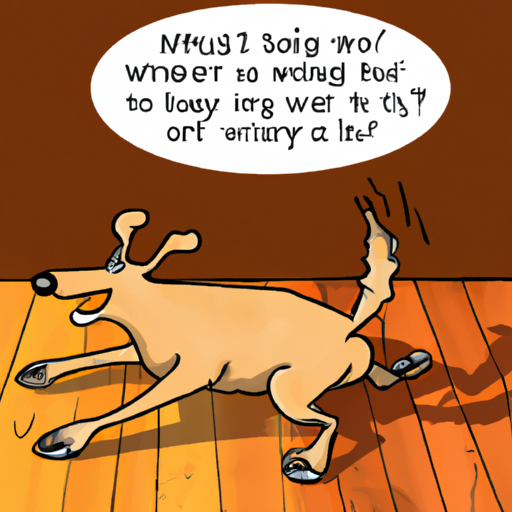As a loving caregiver, it’s only natural that you want to understand every action your furry friend makes. One such behavior that may seem peculiar, yet is rather common among dogs, is rubbing their bum on the floor, often referred to as ‘scooting’. This act can be amusing, but it might also indicate an issue that needs your attention.
Table of Contents
- Understanding Why Dogs Scoot
- Possible Causes of Scooting
- How to Address Scooting
- Preventative Measures
- FAQs
Key Takeaways
- Scooting is a common behavior in dogs that can indicate various underlying health issues.
- Possible causes range from anal gland issues, parasites, allergies, to rectal problems.
- Consulting a vet is crucial when you observe excessive scooting.
- Regular grooming, diet management, and parasite control can help prevent scooting.
Understanding Why Dogs Scoot
Dogs have a unique way of communicating their discomfort. When they scoot or drag their hind end along the floor, they’re usually trying to alleviate an itch or discomfort in the anal region. This behavior is their way of dealing with the discomfort they can’t reach with their paws or mouths.
A frequent misunderstanding is that scooting is a sign of worms. While this can be true, parasites are just one of the many potential causes. It’s essential to avoid jumping to conclusions and seek professional advice instead. PetMD provides a wealth of information about pet health and behaviors that can aid in understanding your pet better.
Possible Causes of Scooting
Several reasons can prompt your dog to scoot. Here are the most common ones:
- Anal Gland Issues: Dogs have two small glands located on either side of their rectum that release a smelly liquid when they poop. If these glands don’t empty properly, it can cause discomfort and lead to scooting.
- Parasites: Intestinal parasites like tapeworms can cause itchy rear ends prompting your pet to scoot.
- Allergies: Just like humans, dogs can also have allergies causing itchy skin, including around their rear end.
- Rectal Problems: Any discomfort or injury in the rectal area, such as tumors or rectal prolapse, can cause scooting.
How to Address Scooting
If you notice your dog scooting excessively, it’s time to consult a vet. They can perform a thorough examination to determine the exact cause and provide appropriate treatment. Depending on the cause, the treatment can range from expressing the anal glands, administering medication for parasites, or managing allergies. In more severe cases, surgical intervention might be necessary.
Onetopdog offers a variety of articles on pet care, including this one on how to groom your dog at home, which can help manage some issues causing scooting.
Preventative Measures
Prevention is always better than cure, and some measures can help prevent scooting:
- Regular Grooming: Keeping your dog clean can prevent many skin issues. Regular grooming sessions can also help you spot any unusual signs early.
- Diet Management: A balanced diet helps maintain overall health, including the digestive system.
- Parasite Control: Regular deworming can help prevent parasite infestations.
Here is an article on how to keep your dog healthy, and here is another on choosing the best food for your dog.
Frequently Asked Questions
Why is my dog dragging his bum on the carpet?
This act, also known as scooting, is usually a sign of discomfort in the anal area.
Should I take my dog to the vet if he is scooting?
Yes, if your dog is scooting excessively, it’s best to consult a vet to determine the cause and get appropriate treatment.
Can I prevent my dog from scooting?
Yes, regular grooming, a balanced diet, and parasite control can help prevent scooting.
Remember, as a caregiver, your pet’s health and comfort rely on your actions. If you notice any unusual behaviors, it’s always best to consult with a veterinary professional to ensure your furry friend’s well-being. Regular check-ups, a balanced diet, and plenty of love can go a long way in keeping your pet healthy and happy!



